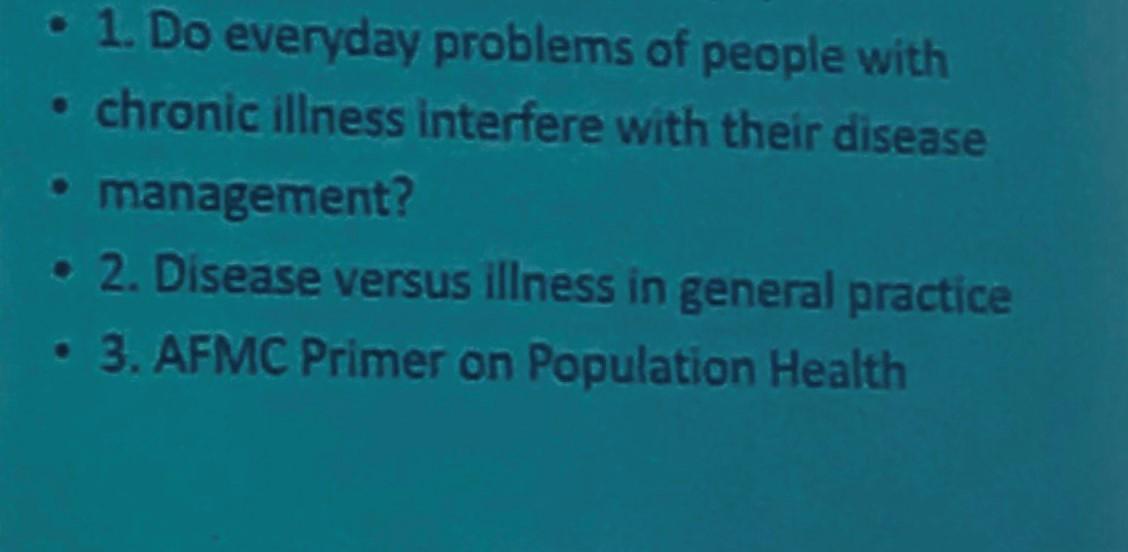Transcribed Image Text from this Question
• 1. Do everyday problems of people with • chronic illness interfere with their disease • management? • 2. Disease versus illness in general practice • 3. AFMC Primer on Population Health
(Visited 5 times, 1 visits today)
Related posts:
- Question: — Of 5 Points Question 8 2 Tries Left In His Theory About Aging, Erik Erikson Explained How Elderly People Must Resolve The Dilemma Of O Despair Versus Denial O Achievement Versus Retirement O Integrity Versus Despair O Industry Versus Inferiority Submit
- Question: Explain How Chronic Illness Imposes A Burden On The Health And Quality Of Life Of The Older Adult, And Identify Ways Of Preventing Chronic Illnesses. Each Student Should Select A Chronic Illness To Cover Such As Kidney Disease And Discuss The Progression An Older Adult May Face Through The Phases Of Nonfatal, Serious, And Frailty, Using The Nursing …
- Question: AT&T 13:22 @ 24% Expert Q&A Explain How Chronic Illness Imposes A Burden On The Health And Quality Of Life Of The Older Adults And Identity Ways Of Preventing Chronic Illnesses. Each Student Should Select A Chronic Illness Tc Cover Such As Kidney Disease And Discuss The Progressionan Older Adult May Face Through The Phases Of Nonfatal, Serious, And …
- Question: Assume A Population Of 25,000 People In Blue Earth, Mankato Of Whom 5000 Truly Have COVID- 19 Disease. A New Screening Test That Uses Body Sweat Is Used To Identify 4000 People Who Have The Disease. Also, The New Screening Test Identified 18,500 People As Negative Who Were Without The Disease. Complete The Following Table. How Many People Have The Disease? …
- Question: Indigenous (Australia) People Are Hospitalised For Mental Health Issues At Twice The Rate Of NonIndigenous People And Improving The Mental Health Of Indigenous People Is A National Health Priority (AIHW, 2020). Critically Analyse Contemporary Literature And Discuss Five (5) Aetiological Factors Relating To Mental Illness In Indigenous People. Describe …
- Question: Consider The Ways You Have Heard The Words Nutrient And Nutrition In Your Everyday Life.Respond To The Following In A Minimum Of 175 Words:Based On Your Exposure So Far, What Do You Think These Words Mean? How Are They Different? Do You Think The Everyday Use Of These Words Might Be Consistent With Scientific Definitions? Why, Or Why Not?
- Question: QUESTION 21 From The Reading: AE 22 “Population Health And Older Adults”: 1) Describe Two Major Public Health Achievements In The 20th Century. 2) Discuss Why Public Health Needs To Move Beyond Primary Prevention To “chronic Disease Management. 3) Identity At Least One “obstacle” That Needs To Be Addressed In Order To Move Toward This Management.” 3 …
- Question: From The Reading: AE 2.2 “Population Health And Older Adults”: 1) Describe Two Major Public Health Achievements In The 20th Century. 2) Discuss Why Public Health Needs To Move Beyond “primary Prevention” To “chronic Disease” Management. 3) Identify At Least One “obstacle” That Needs To Be Addressed In Order To Move Toward This “management.”
- Question: From The Reading: AE 2.2 “Population Health And Older Adults”:1) Describe Two Major Public Health Achievements In The 20th Century.2) Discuss Why Public Health Needs To Move Beyond “primary Prevention” To “chronic Disease” Management.3) Identify At Least One “obstacle” That Needs To Be Addressed In Order To Move Toward This “management.”
- Question: Define Chronic Restrictive Pulmonary Disease? What Is The Difference Between Chronic Obstructive And Chronic Restricitive Pulmonary Disease? What Are The Modifiable And Non-modifiable Risk Factors For Development Of CVD (Cardiovascular Disease)?




